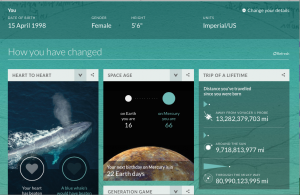Of birth dates and houseflies: Gaining a new teaching perspective
Every once in awhile, an experience slaps us in the face, screaming. “Take a look at the big picture! Get some perspective!” It may be a reunion, a funeral, or even a web resource. Starting Sunday, TeachersFirst is featuring BBC’s Your Life on Earth, reviewed here. This clever interactive asks for your birthdate and some basic information (gender and height) in order to provide comparisons and measures of your life through the lens of our planet Earth.
For some reason, I decided to try focusing on the lifetime of TeachersFirst, entering that TeachersFirst is female and of “average” height for a teacher (5′ 6″). The results provide several metrics of what has gone on since TeachersFirst was “born” back in April, 1998:
- A house fly your age would have a family of 6,135 generations by now.
Interesting but not terribly meaningful to me. I am glad we have not seen that many generations of students. We teachers sometimes have trouble adjusting to the changes of just half a generation. - Population has increased by1,268,481,846 since you were born.
That’s a lot of new students for today’s teachers, all aged zero to 16! - The North American Plate has moved 2’7“ (Actually, this is the measurement of the “seafloor spread in the Gulf of California, pushing the North American Plate in a southeasterly direction.”)
I don’t think TeachersFirst can take any credit for this, though we do try to help teachers shift their thinking about how technology can fit into learning. - The per capita global food supplies of bananas, apples, and eggs are way up.
It would be nice to think that the students and teachers using TeachersFirst all have enough to eat, but I know they do not. - The renewable energy supply is up 50%, but 240.8 million acres of forest cover have been lost– in just 16 + years!
So what will today’s kindergarteners see when they are 30?
TeachersFirst’s mission is to provide resources to support teaching and learning across all subjects K-12 and to help teachers envision and implement effective use of technology as a tool for learning. In a broader sense, as teachers we are all trying to empower kids to understand, sustain, and improve the world they live in — and ultimately grow to lead.
I am grateful that people like the BBC occasionally remind Thinking Teachers of our mission. The questions and comparisons that grow out of a different perspective are something every teacher needs. Try entering the start date of your teaching career as a “birthdate” to see what has changed.



